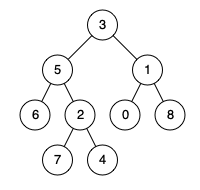Given a binary tree, find the lowest common ancestor (LCA) of two given nodes in the tree.
According to the definition of LCA on Wikipedia: “The lowest common ancestor is defined between two nodes p and q as the lowest node in T that has both p and q as descendants (where we allow a node to be a descendant of itself).”
Given the following binary tree: root = [3, 5, 1, 6, 2, 0, 8, null, null, 7, 4]

Example 1:
Input: root =
[3, 5, 1, 6, 2, 0, 8, null, null, 7, 4], p = 5, q = 1Output: 3
Explanation: The LCA of nodes 5 and 1 is 3.
Example 2:
Input: root =
[3, 5, 1, 6, 2, 0, 8, null, null, 7, 4], p = 5, q = 4Output: 5
Explanation: The LCA of nodes 5 and 4 is 5, since a node can be a descendant of itself according to the LCA definition.
Note:
- All of the nodes’ values will be unique.
- p and q are different and both values will exist in the binary tree.
Solution
from Util.binaryTree import TreeNode
from typing import Dict
from collections import deque
class Solution:
def lowestCommonAncestor(self, root: TreeNode, p: TreeNode, q: TreeNode) -> TreeNode:
if q == p:
return q
if q == root or p == root:
return root
nodeParent = { root.val: root }
nodeStack = [root]
while nodeStack:
walker = nodeStack.pop()
if walker.left:
nodeParent[walker.left.val] = walker
nodeStack.append(walker.left)
if walker.right:
nodeParent[walker.right.val] = walker
nodeStack.append(walker.right)
ancestorDict = { root.val: root }
while p != root:
ancestorDict[p.val] = nodeParent.get(p.val)
p = nodeParent.get(p.val)
while not ancestorDict.get(q.val):
q = nodeParent.get(q.val)
return q
Test Cases
from Util.binaryTree import TreeNode, Codec
test = Solution()
codec = Codec()
root = codec.deserialize('[3,5,1,6,2,0,8,null,null,7,4]')
p = TreeNode(5)
q = TreeNode(1)
answer = test.lowestCommonAncestor(root, p, q)
assert answer.val == 3
root = codec.deserialize('[3,5,1,6,2,0,8,null,null,7,4]')
p = TreeNode(5)
q = TreeNode(4)
answer = test.lowestCommonAncestor(root, p, q)
assert answer.val == 5
root = codec.deserialize('[3,5,1,6,2,0,8,null,null,7,4]')
p = TreeNode(3)
q = TreeNode(3)
answer = test.lowestCommonAncestor(root, p, q)
assert answer.val == 3
root = codec.deserialize('[3,5,1,6,2,0,8,null,null,7,4]')
p = TreeNode(0)
q = TreeNode(0)
answer = test.lowestCommonAncestor(root, p, q)
assert answer.val == 0
print('All Passed!')
Big O Analysis
Space Complexity: O(N)
Time Complexity: O(N)
